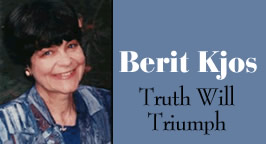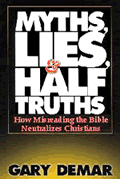Other Kjos Articles:
Harry Potter and The Postmodern Church
Popular Occultism and the Consensus Process
Legalized Mind Control Part 1Harry Potter And The Chamber of Secrets
Part 1
Hegelian Alchemy And
Mind Changing Games
Part 2
Pagan Fantasies Join The Digital Explosion
Part 3
The Global Message Behind Mystical
Thrills
GENOCIDE: PREVENTION, "MENTAL HEALTH" AND HUMAN NATURE
By Berit Kjos
November 12, 2004
NewsWithViews.com
"I was sleeping when the attack on Disa started. I was taken away by the attackers, they were all in uniforms. They took dozens of other girls and made us walk for three hours. During the day we were beaten and they were telling us: 'You, the black women, we will exterminate you, you have no god.' At night we were raped several times. The Arabs guarded us with arms and we were not given food for three days."[1] A female refugee from Disa [Masalit village, West Darfur, Sudan], interviewed by Amnesty International delegates.
"When we tried to escape they shot more children. They raped women; I saw many cases of Janjawid raping women and girls. They are happy when they rape. They sing when they rape and they tell that we are just slaves and that they can do with us how they wish."[1] A 37-year-old woman from Mukjar
The tragic testimonies of starved and wounded refugees from the marauding militia of western Sudan break our hearts and defy simple answers. So do the horrendous atrocities, twisted ideologies, and collective cruelties that characterized 20th century genocide. How can we forget the shocking images of Hitler's death camps, Soviet pogroms and mind-twisting torture, Hutu slaughter, and Islamic Jihad aimed at the entire population of native Christians in southern Sudan? Those horrors refute today's positive notions about human nature and basic goodness. Instead, they affirm what God's Word told us thousands of years ago: "The heart is deceitful above all things, and desperately wicked; who can know it?" (Jeremiah 17:5-10)
What have our global managers done to stop genocide? The UN passed a law against it; nations around the world agreed to outlaw and punish it; countless commissions and conferences have discussed it; voices around the world have decried it; perpetuators have denied it; and most of the public has ignored it. Even the current horrors in the Sudan, where the Islamic government has been supporting heartless militia assaults on its non-Arab population, have not awakened enough of an outcry to stop the killing, rape and torture of defenseless villagers. Why not?
Could it be that the global management systems -- which have despised Biblical truth and moral standards from its beginning -- have no real solution to the problem of evil? Or are they just too weak, too biased, and too politicized to cope with problems that might offend some of their best friends. As David Brooks wrote in his September article, "Another 'Triumph' for the UN,"
"The United States said the killing in Darfur was indeed genocide, the Europeans weren't so sure, and the Arab League said definitely not, and hairs were split and legalisms were parsed, and the debate over how many corpses you can fit on the head of a pin proceeded in stentorian tones while the mass extermination of human beings continued at a pace that may or may not rise to the level of genocide. For people are still starving and perishing in Darfur. ...
"The resolution passed, and it was a good day for alliance-nurturing and burden-sharing -- for the burden of doing nothing was shared equally by all. And we are by now used to the pattern. Every time there is an ongoing atrocity, we watch the world community go through the same series of stages: (1) shock and concern (2) gathering resolve (3) fruitless negotiation (4) pathetic inaction (5) shame and humiliation (6) steadfast vows to never let this happen again.
"The 'never-again' always comes...."[2]
Actually, behind the ineffective visible response to genocide, there is a hidden plan. The UN has established a massive, worldwide, inter-agency program of "prevention." Through the coordinated efforts of Unesco, The World Health Organization, The World Bank and countless other UN agencies, it's effectively transforming not only beliefs and values everywhere, but also schools, churches, communities and nations. For the war and genocide "crises" have been used for more than fifty years to persuade the world to participate in "peace-building" ventures that strive to create a "climate of prevention" everywhere -- a cultural atmosphere defined by UN declarations such as Unesco's Declaration on Tolerance and Declaration of Principles on Religion in a Culture of Peace. It requires "cradle-to-grave" learning, re-learning, group-learning and service-learning along with continual assessments and monitoring for compliance with new global standards for human resource development. All minds must be molded to fit the utopian vision for the 21st century community.
Never mind the fact that most of the UN treaties and declarations violate the U.S. Constitution (especially the Bill of Rights) and undermine our freedom to express our beliefs, share our faith, and take a stand on the unchanging truths of the Bible. What counts is progress toward the envisioned global solidarity -- a world where no one holds a belief or takes a stand contrary to UN ideology -- and where everyone is willing to compromise their values, seek common ground, and flow with the group consensus.
The celebrated Universal Declaration of Human Rights illustrates this vision well. Like all the intrusive UN human rights treaties, it's written to please the public. Article 18 upholds "the right to freedom of thought, conscience and religion..." Article 19 affirms "the right to freedom of opinion and expression... and to seek, receive and impart information and ideas through any media and regardless of frontiers." But Article 29 states that "these rights and freedoms may in no case be exercised contrary to the purposes and principles of the United Nations." In other words, these "rights" or "freedoms" don't apply to those who would question the UN or its policies. Your rights would be conditioned on your compliance.
As you will see later, Biblical Christianity hinders this new solidarity. In contrast, genocide supports it, because it provides the shocking crises needed to persuade the masses that they must change and sacrifice in order to fulfill the humanist vision of unending peace on this "evolving" planet.
"A CULTURE of PREVENTION"
In 1999, the United Nations published a pamphlet by Secretary-General Kofi Annan titled, "Facing the Humanitarian Challenge: Towards a Culture of Prevention." In it, Mr. Annan states:
"As must now be evident, the common thread running through almost all conflict prevention policies is the need to pursue what we in the United Nations refer to as good governance. In practice, good governance involves promoting the rule of law, tolerance of minority and opposition groups.... Above all, good governance means respect for human rights." [See what that means in "Trading U.S. Rights for UN Rules"]
"Long-term prevention strategies, in addressing the root causes of conflict, seek to prevent destructive conflicts from arising in the first place. They embrace the same holistic approach to prevention that characterizes post-conflict peace-building...."
Do you wonder what he means by a holistic approach? It has to do with the vision of unity, wholism, solidarity, interconnectedness or -- as the new global management puts it -- a systems approach based on "General Systems Theory." Since I wrote an article to introduce this new governance process three years ago, I suggest you read "Reinventing the World."
But "peace-building" implies more specific action than simply an holistic approach. An Unesco publication I picked up in Istanbul during the 1996 UN Conference on Human Settlements (Habitat II) clarifies the basic issues. Ponder the following excerpts from Our Creative Diversity: Report on the World Commission on Culture and Development. The first paragraph was written by former UN Secretary-General Javier Perez de Cuellar:
"I have for some time been concerned with the 'culture of peace.' There is now considerable evidence that neglect of human development has been one of the principal causes of wars and internal armed conflicts.... The concept of state sovereignty which still prevails today has increasingly come under scrutiny. ...
"An ounce of prevention is better than a ton of punishment. ...
"Imagination, innovation, vision and creativity are required... It means an open mind, and open heart and a readiness to seek fresh definitions, reconcile old opposites, and help draw new mental maps." [pages 11-12]
"There should be a commitment to building 'a culture of peace'... 'a process by which positive attitudes to peace, democracy and tolerance are forged through education and knowledge about different cultures.' It is a process that is built on the proactive stance of peace building:....
"Universalism is the fundamental principle of a global ethics." [pages 45-46]
"Religion... has affected and sometimes poisoned the relations between majorities and minorities.... Even today, politicized religion often appears to contribute more to the intensification of conflict than to the construction of peace....
"Extreme doctrinaire views look to an imagined past, seen as both simpler and more stable, thus preparing the ground not only for a variety of overtly violent acts but also for the intimidation of individual and indeed entire communities in matters of thought, behavior and belief, coercing them into accepting a single 'orthodox' point of view....
"The late twentieth-century present politicized, fundamentalist tendencies in all religions. ... The challenge today, as in the past is to... distinguish between the beliefs and activities of the peaceful majority... and a minority of extremists...." [pages 67-68
"To promote pluralistic societies and resolve existing conflicts requires the recognition of the variety of structures that acquire legitimacy for different aspects of social life." [page 72]
These phrases show an amazing consistency in ideology and vision within the United Nations since its founding in 1945. Some of the same words and anti-Biblical sentiments were used by the respective founding heads of both Unesco and the World Health Organization. You may want to compare the statements by Julian Huxley and Dr. Brock Chisholm with those above.
In a more recent UN report, Kofi Annan announced his plan to appoint a "Special Advisor on Genocide Prevention" and to launch an "Action Plan to Prevent Genocide." On the surface, his words sound reasonable, but keep in mind that his terms are grounded in a global agenda that has no tolerance for Biblical absolutes. In the context of UN pluralism and purposes, God's Word is considered incendiary. That's why "hate crimes" laws in a growing number of nations and states are directed at Christians who take a moral stand on certain issues. For example, relying on Biblical guidelines to evaluate moral behaviors such as homosexuality and adultery is now equated with hatred, intolerance, dehumanization, etc. Please ponder Mr. Annan's words:"
"I wish today to launch an Action Plan to Prevent Genocide, involving the whole United Nations system. ... We must work together with the international financial institutions, with civil society, and with the private sector, to ensure that young people get the chance to better themselves through education and peaceful employment, so that they are less easily recruited into predatory gangs and militias.
"We must protect the rights of minorities, since they are genocide�s most frequent targets. By all these means, and more, we must attack the roots of violence and genocide: hatred, intolerance, racism, tyranny, and the dehumanizing public discourse that denies whole groups of people their dignity and their rights. ...
"Wherever civilians are deliberately targeted because they belong to a particular community, we are in the presence of potential, if not actual, genocide."[4]
Countless documents show the universal influence of this UN agenda. One such document titled "Holocaust, Genocide, & Human Rights" follows the same theme but adds some relevant details:
"We live in a time of unparalleled instances of democide, genocide and ethnocide. The Holocaust, the genocides in Turkey, Cambodia, Tibet, & Bosnia, the disappearances in Argentina & Chile, the death squad killings in El Salvador, Stalin's purges, the killing of the Tutsi in Rwanda... and the list goes on....
"It is imperative that a greater understanding of the psychological, cultural, political, and societal roots of human cruelty, mass violence, and genocide be developed. We need to continue to examine the factors which enable individuals collectively and individually to perpetrate evil/genocide and the impact of apathetic bystanders as fuel for human violence. While an exact predictive model for mass violence/human cruelty is beyond the scope of human capability, we have an obligation to develop a model that highlights the warning signs and predisposing factors for human violence and genocide. With such information, we can develop policies, strategies, and programs designed to counteract these atrocities."[5]
Gregory Stanton has developed one such model. "Written in 1996 at the Department of State," his paper on the "Stages of Genocide" was presented at the Yale University Center for International and Area Studies two years later. "Genocide," wrote Mr. Stanton, "is a process that develops in eight stages that are predictable but not inexorable. At each stage, preventive measures can stop it."[6]
These stages make sense. They do trace the advance of collective or national genocidal tendencies, but their progressive steps toward prevention should sober us. Even the early stages are designed to establish laws and social guidelines that silence those who clash with politically correct standards.
To read the rest of the article,
please go to
GENOCIDE
Endnotes:
1.
A female refugee from Disa [Masalit village, West Darfur], interviewed
by Amnesty International delegates in Goz Amer camp for Sudanese refugees
in Chad, May 2004. See "Darfur:
Rape as a weapon of war: sexual violence and its consequences"
2.
David Brooks, "Another "Triumph"
for the U.N.," New York Times, September 25, 2004.
3.
www.preventgenocide.org/law/convention/
text.htm
4.
"Action
Plan to Prevent Genocide"
5.
"Holocaust,
Genocide, & Human Rights"
6.
Gregory Stanton, "Eight
Stages of Genocide," 1996. Part of a longer paper titled "How
We Can Prevent Genocide: Building an International Campaign to End Genocide."
� 2004 Berit Kjos - All Rights Reserved
Sign Up For Free E-Mail Alerts
E-Mails are used strictly for NWVs alerts, not for sale
Berit Kjos is a widely respected researcher, writer and conference speaker. A frequent guest on national radio and television programs, Kjos has been interviewed on Point of View (Marlin Maddoux), The 700 Club, Bible Answer Man, Beverly LaHaye Live, Crosstalk and Family Radio Network. She has also been a guest on "Talk Back Live" (CNN) and other secular radio and TV networks. Her last two books are A Twist of Faith and Brave New Schools. Kjos Ministries Web Site: http://www.crossroad.to/index.html
The World Health Organization, The World Bank and countless other UN agencies,
it's effectively transforming not only beliefs and values everywhere,
but also schools, churches, communities and nations.










